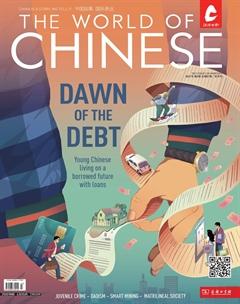Creating an Atmosphere
杨婷婷
Picture this: flashing lights, heavy bass, and attractive young people gyrating on the dance floor. Where are we? Probably a club that has recruited a team of semi-professional partiers known as a 氣氛组 (q#f8n z^, “atmosphere group”), given free drinks and other incentives to visit the venue and create a busy atmosphere.
Originating from a real practice used by venues to draw in more customers, the term “atmosphere group” has since expanded to describe other forms of pretense. This started with an online comment asking why so many people sit in Starbucks with a laptop and a cup of coffee, and whether they are only pretending to be busy and successful.
Sensing a marketing opportunity, the coffee chain announced on Weibo that it was starting an official “Starbucks Atmosphere Group (星巴克气氛组 X~ngb`k- q#f8n z^),” with coupons and bonuses for the first 30 people to join. To sign up, one must visit a Starbucks café, announce the fact on Weibo, and send a screenshot of the upvotes to Starbucks account.
The campaign made “atmosphere group” synonymous with 托儿 (tu4r), a term for paid shills that companies hire to write positive reviews of their products. The term “milk tea atmosphere group (奶茶气氛组 n2ich1 q#f8n z^)” relates to a rumor that viral milk tea shops with big crowds actually hire people to line up at the store to drum up more business.
“Atmosphere group” can refer to other pretentious behavior in everyday life. For instance, the “postgraduate admission test atmosphere group (考研气氛组 k2oy1n q#f8n z^)” is a phrase mocking those who pretend to study hard but put in no real effort. The “workout atmosphere group (健身气氛组 ji3nsh8n q#f8n z^)” are those friends who take overzealous selfies at the gym. During Chinese New Year, those who were unable to travel home due to Covid-19 restrictions called themselves the “celebrating Spring Festival atmosphere group (过年气氛组 gu7ni1n q#f8n z^),” describing their efforts to create a festive mood in the city.
The opposite of the atmosphere group is 实干组 (sh!g3n z^, practice group), which refers to industrious people who actually put effort into their work and study. Those who burn the midnight oil at the library to finish school assignments (perhaps to compensate for group members pretending to work at Starbucks) call themselves the “self-study practice group (自习室实干组 z#x!sh# sh!g3n z^).” If you fail to achieve your New Years resolution, you could say, “I wanted to join the practical group, but it turns out I am part of the atmosphere group (本来想成为实干组,结果现在成气氛组了 B0nl1i xi2ng ch9ngw9i sh!g3n z^, ji9gu6 xi3nz3i ch9ng q#f8n z^ le).”
At the heart of the tension between “atmosphere” and “practice” is a culture of vanity in todays China. This has become a topic of social debate, from the “fake socialites” who go to elaborate lengths to create the impression of a high-end lifestyle on social media, to the online “Versailles literature” of humblebragging. These new buzzwords mock these image-conscious trends, reminding people to pay attention to real life—and not to get too caught up in the atmosphere.
 汉语世界(The World of Chinese)2021年2期
汉语世界(The World of Chinese)2021年2期
- 汉语世界(The World of Chinese)的其它文章
- Hollow Comfort
- 火车上的陌生人
- All in a Day’s Wok
- dawn of the debt
- Enabling the Movement
- 学中文
